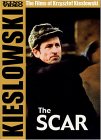| Reviews & Columns |
|
Reviews DVD TV on DVD Blu-ray 4K UHD International DVDs In Theaters Reviews by Studio Video Games Features Collector Series DVDs Easter Egg Database Interviews DVD Talk Radio Feature Articles Columns Anime Talk DVD Savant Horror DVDs The M.O.D. Squad Art House HD Talk Silent DVD
|
DVD Talk Forum |
|
|
| Resources |
|
DVD Price Search Customer Service #'s RCE Info Links |
|
Columns
|
|
|
Scar, The
It has been decided that the rural town of Olecko, Poland will be the new site for a massive chemical factory. Stefan Bednarz (Franciszek Pieczka), an Engineer and a humanist, is appointed by the local Communist Party to supervise its construction. The development is supposed to bolster the town's economy, as well as, providing badly needed new jobs. Instead of these benefits, the locals can only see negative ramifications of the factory's construction. Namely, the effect on the environment, as forests are razed to make way for the construction and the destruction of their homes in place of monstrous apartment complexes to house the multitude of workers. In the end, Bednarz is responsible to the local Party representatives, with or without the resident's consent.
The Scar is told with a documentarian's eye to detail, letting each scene unfold with a kind of natural rhythm. Some may find this type of storytelling slow, but it definitely shows the bridge between Kieslowski's documentary beginnings and his feature film career. The Scar is filled with the kinds of narrative devices and stylistic touches that would come to define his later work. A good example is a scene in which a deer, forced from its native habitat by the factory's construction, wanders into a Communist Party meeting. The deer is so starved that it will eat anything given to it, including an entire pack of cigarettes, fed to it by an amused Party member.
The title of the film, The Scar, does not derive from a single wound, since there are many "scars" within the film. Besides the physical scarring of the town to make way for the factory, there are also the many psychological "scars" afflicting several of the characters. Kieslowski is exploring the chaos of human nature acting out within a totalitarian State. By showing the interactions between the town's politicians, activists and citizens, he presents a society whose ideology has brought them to a standstill. It's a statement about the failure of communism, but also an observation on the contradictions that are inherent within humanity, a favorite subject of Kieslowski.
Moments in The Scar achieve the same levels of greatness as his later works, but as a whole it never actually addresses its subject head-on. This could be due to Kieslowski's documentary background, since he remains impartial throughout most of the proceedings. However, by presenting too many opposing viewpoints Kieslowski loses the focus of the film and fails to provide a satisfying outcome. It could also be assumed that he may have made some concessions in order to make such a political film while living under Communist rule.
The DVD:
Picture: The movie is presented in an anamorphic widescreen 1.85:1 aspect ratio. The transfer is good, but the picture quality suffers slightly due to the quality of film stock available at the time.
Audio: There is a Dolby Digital 2.0 Mono track in the Original Polish, which sounds fine.
Extras: The DVD Extras include interviews with Kieslowski collaborators Slawomir Idziak (cinematographer), Michal Zarnecki (sound engineer) and filmmaker Agnieska Holland, Kieslowski's short film "Concert of Requests" (1967), a complete Kieslowski Filmography and a Kieslowski Trailer Gallery featuring 6 trailers, including the theatrical trailer for The Scar.
Conclusion: The Scar, while seen as a failure by Kieslowski, perfectly complements his complete body of work. The way he combined his critique of the human condition with the film's diverse array of characters would become one of his trademarks. Far from perfect, The Scar still makes for interesting viewing and offers additional insight into Kieslowski's early career.
|
| Popular Reviews |
| Sponsored Links |
|
|
| Sponsored Links |
|
|
| Release List | Reviews | Shop | Newsletter | Forum | DVD Giveaways | Blu-Ray | Advertise |
|
Copyright 2024 DVDTalk.com All Rights Reserved. Legal Info, Privacy Policy, Terms of Use,
Manage Preferences,
Your Privacy Choices | |||||||













